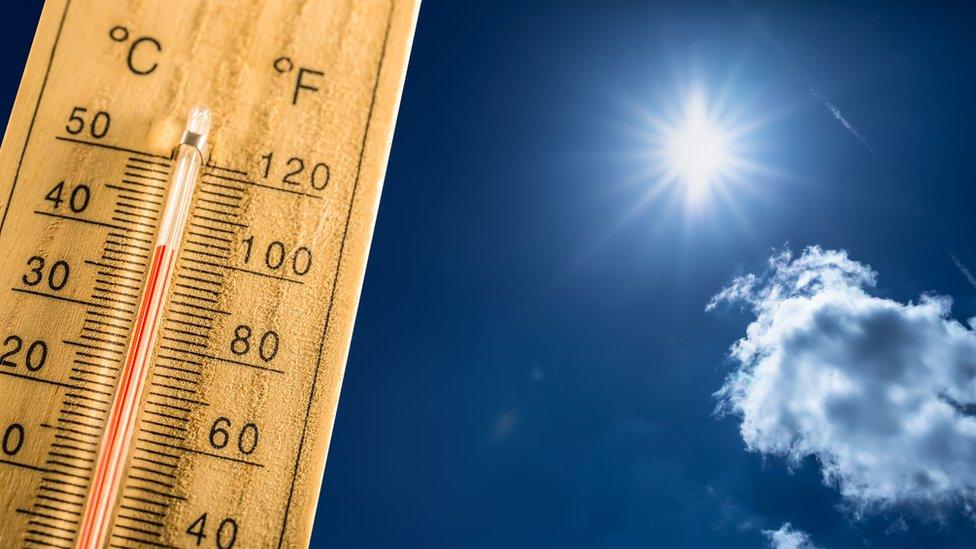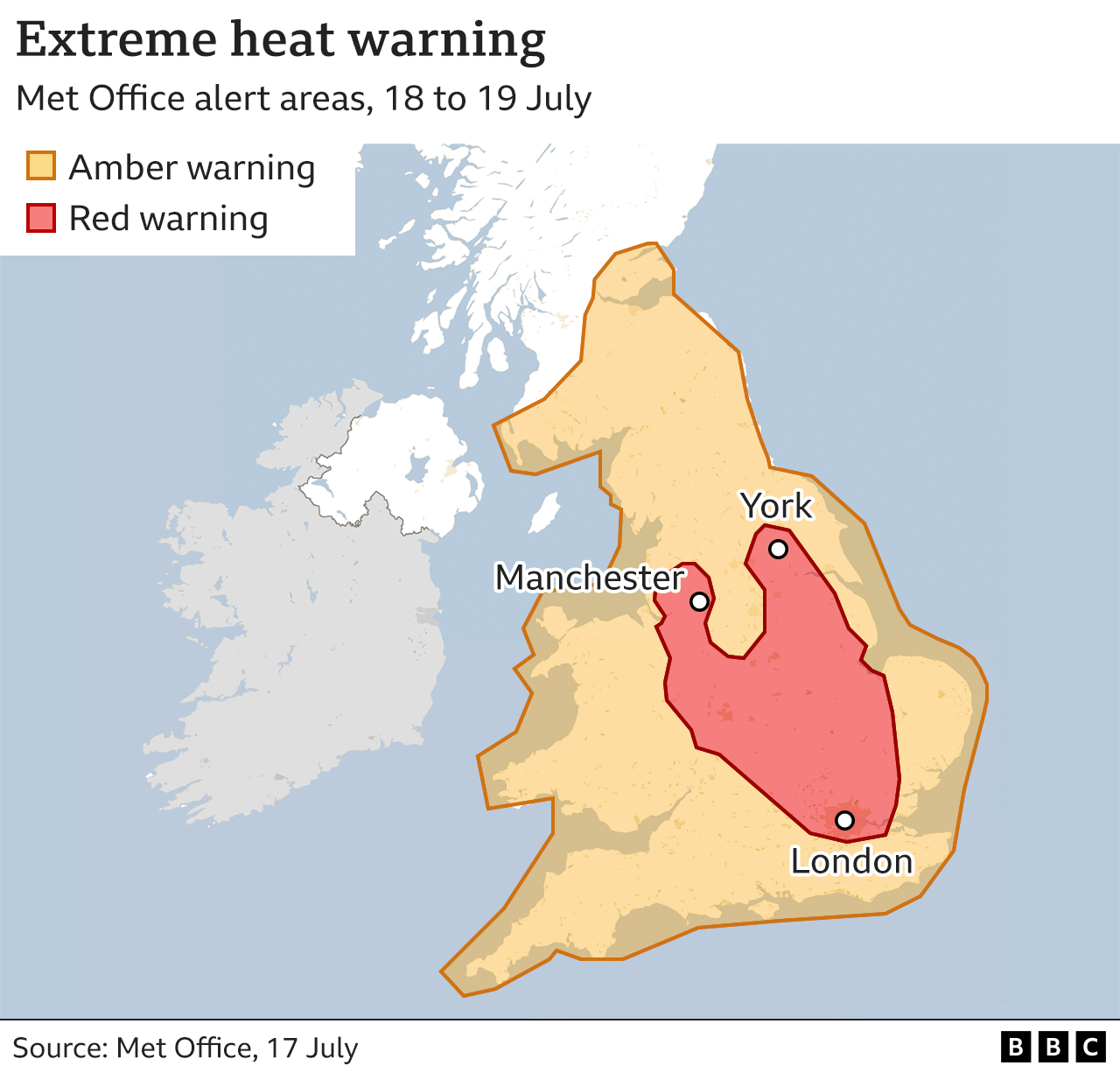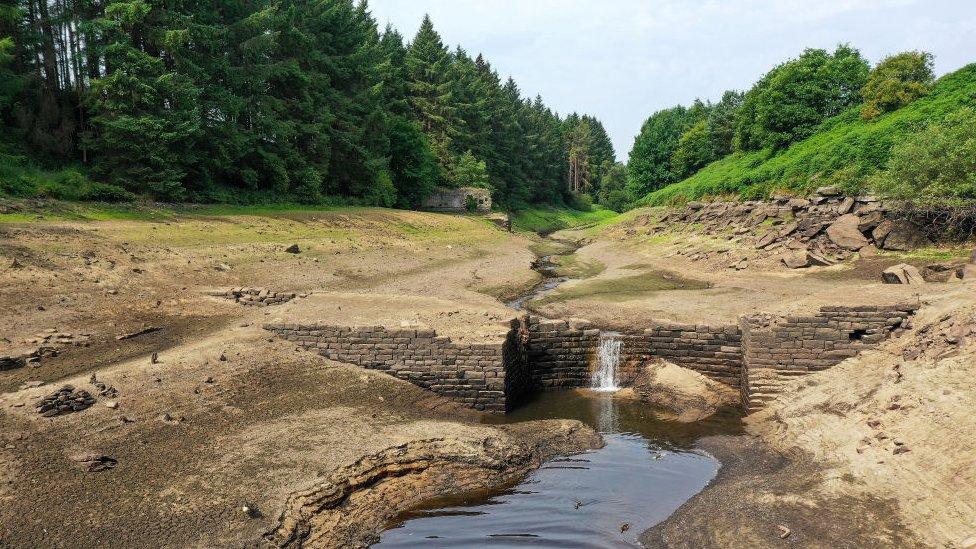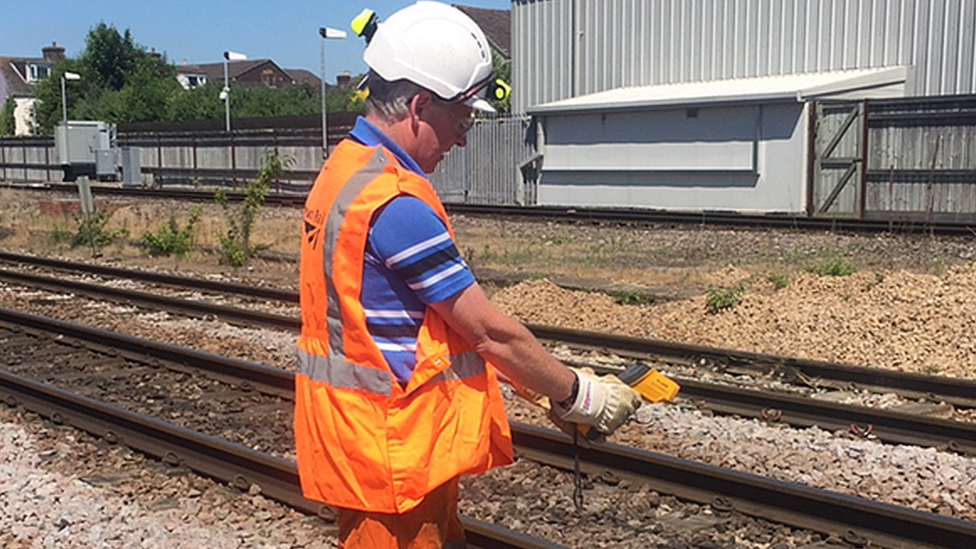UK heatwave: Parts of Yorkshire and Lincolnshire hit 40C
- Published

Temperatures soared across Yorkshire and Lincolnshire on Monday and Tuesday
Temperatures in parts of Yorkshire and Lincolnshire have hit all-time record highs, with some areas experiencing temperatures of more than 40C (104F).
According to provisional Met Office figures, Coningsby in Lincolnshire hit 40.3C on Tuesday - as of 16:00 BST the highest UK temperature ever recorded.
The heat has caused fires, travel disruption and power cuts.
Emergency services in South Yorkshire, East Yorkshire, North Yorkshire and Lincolnshire issued "major incidents".
South Yorkshire Fire and Rescue Service said it was "due to the demand on services from fires across the county".
It added that fires were being "prioritised in relation to risk to life and risk to property".
Humberside Fire and Rescue Service tweeted, external: "Please only call 999 if you have a genuine emergency or if there's an immediate risk to life."
Allow X content?
This article contains content provided by X. We ask for your permission before anything is loaded, as they may be using cookies and other technologies. You may want to read X’s cookie policy, external and privacy policy, external before accepting. To view this content choose ‘accept and continue’.
While the previous temperature record for Yorkshire was 36C (96.8F) in July 2019, Finningley in Doncaster reached 40C on Tuesday.
Earlier, overnight figures showed the temperature at Emley Moor, near Huddersfield, had reached 25.9C (79F), the highest night-time figure recorded in the UK.
However, the Met Office said that temperature measurement only covered a period of 12 hours from 21:00 to 09:00 and official records were based on measurements over a 24-hour period.
Earlier, the forecaster issued a "red" extreme heat warning for parts of the country indicating a threat to life.

On Tuesday evening, about 8,000 properties in Yorkshire, Lincolnshire and the North East remained without electricity, with some believed to have been off since Monday afternoon
Northern Powergrid said the extreme temperatures had caused a "higher than usual number of faults on our network", including sagging conductors and overheating transformers.
Meanwhile, Network Rail issued a "do not travel" warning and many rail operators have cancelled or reduced services.
The East Coast Main Line closed on Tuesday afternoon between York, Leeds and London.
East Midlands Railway warned of cancellations or reductions to its services from Sheffield and Lincoln and told passengers not to travel.
Train operator TransPennine said its services between Manchester Piccadilly and Sheffield were suspended "until further notice".
Its Hull to Manchester Piccadilly route and Huddersfield to Leeds stopping service would also not run on Tuesday, it said.

Analysis - Paul Hudson, Climate Correspondent, BBC Yorkshire
Temperatures like this were meant to be in decades to come.
The fact they are here now has set alarm bells ringing within the climate science community.
For years, climate scientists have been on the wrong end of at times vicious attacks from climate sceptics, who claimed the whole climate change issue was overblown or even a hoax.
The irony is that climate scientists may now be criticised for underestimating the impacts of climate change, not overestimating it.
The theory of global warming may have been to some just that - a theory, unproven.
But it is happening before our very eyes - and its impacts are being felt quicker, and are more intense, than scientists had ever imagined.

In Sheffield, the city's Supertram service was suspended on Tuesday "due to extreme heat and the risk of damage to overhead lines", operator Stagecoach tweeted.
Services were expected to return on Wednesday, Supertram said, apart from a section between Halfway and Birley Lane.
Several schools across Yorkshire and Lincolnshire were closed or shut early and many relaxed their uniform policies to help pupils in the heatwave.
In North Yorkshire, parts of a village totally submerged when Thruscross reservoir was created in the 1960s re-emerged as water levels dropped in the hot weather.

As water levels have fallen, remnants of a flooded village appeared at a North Yorkshire reservoir
Yorkshire Water said it was dealing with the highest levels of water usage across its supply area since 2006.
Neil Dewis, director of water, said: "Our reservoirs are still feeling the impact and levels do continue to decrease.
"As the ground is incredibly dry, we would need a few weeks of wet weather to help them return to their usual levels, so it's really important people keep taking steps to save water throughout the summer."
Aysgarth Falls, a popular tourist destination on the River Ure in the Yorkshire Dales, usually sees the beck flowing down three waterfalls but the hot weather caused it to run dry.
Councils across the region are on standby to deal with the heat causing problems with road surfaces.
Lincolnshire County Council said a road surface temperature of 54.3C (130F) was recorded in Martin, Timberland, at about 13:00 BST on Monday.
The council said it had deployed a special gritter named Spreaddie Mercury to dust sand on road surfaces in a bid to reduce temperatures.

Yorkshire Wildlife Park has closed its doors so staff can look after the animals
A number of visitor attractions shut their doors due to the hot weather.
Staff at Yorkshire Wildlife Park, near Doncaster, said it would remain closed on Tuesday to allow them to look after the animals in the heat, although its Yorkshire Hive cafe and shop were still open.
In Wakefield, the Yorkshire Sculpture Park, closed its gates until Wednesday due to "the red weather warning in place".
Dry conditions also resulted in several fires.
Allow X content?
This article contains content provided by X. We ask for your permission before anything is loaded, as they may be using cookies and other technologies. You may want to read X’s cookie policy, external and privacy policy, external before accepting. To view this content choose ‘accept and continue’.
In the East Lindsey district of Lincolnshire, six fire engines were called to a blaze involving several fields and bales at Gayton Top, near Gayton Le Marsh.
The fire service advised people living nearby to keep all doors and windows closed.
Meanwhile, South Yorkshire Fire and Rescue Service said its crews had tackled a large blaze in a field at Hatfield near Doncaster.
Four fire crews were also dealing with a second large-scale fire in the borough in a field and a barn off Rossington Road while several fire engines were sent to tackle field fires at Sprotbrough.

Follow BBC Yorkshire on Facebook, external, Twitter, external and Instagram, external. Send your story ideas to yorkslincs.news@bbc.co.uk, external.
Related topics
- Published18 July 2022

- Published18 July 2022

- Published18 July 2022
